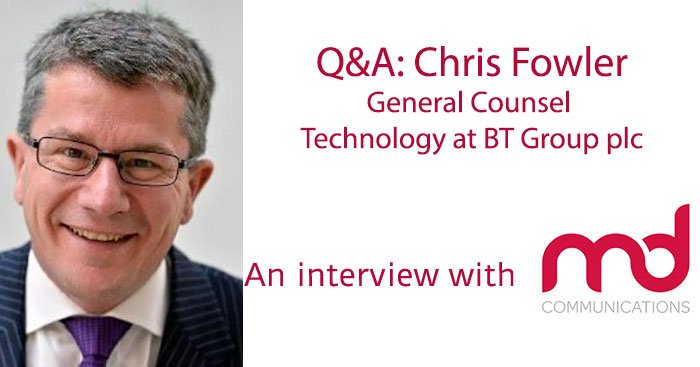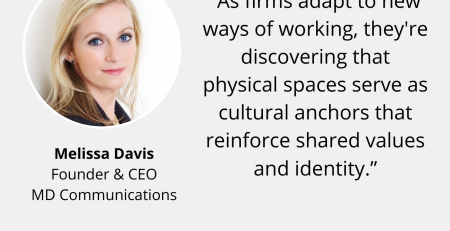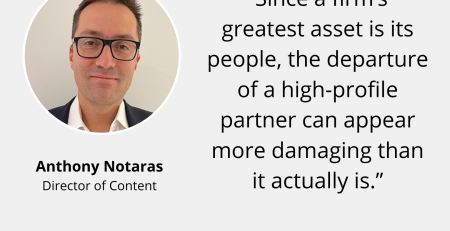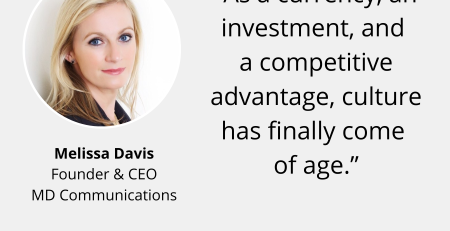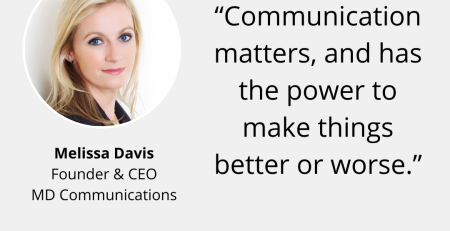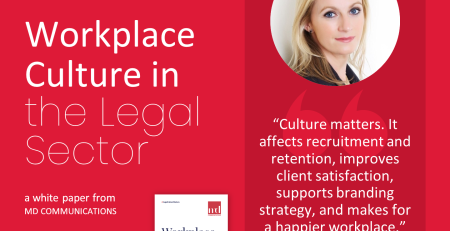In our latest Thought Leader interview, Chris Fowler, General Counsel Technology at BT Group, talks about what he looks for in an external legal adviser, the influence of the legal directories and how technology has affected the delivery of legal services.
What do you look for in your external legal adviser and what would you advise those wanting to be instructed by you to do to ensure it happens?
Genuine interest in the business and the sector – ability to appreciate/understand the output needed – and consistently able to over deliver on promises. Ability to constructively challenge and bring examples of workarounds from comparable situations.
What has put you off instructing firms in the past?
Where it’s been a purely transactional relationship/unable to see the bigger picture/poor account management and lack of desire to think differently.
How much influence do the legal directories have in terms of your understanding and decision making for appointing external counsel?
They’re really valuable for situations where you’re not familiar with a particular market, geography or sector. If we have a specialised legal issue (such as environmental law) that lands on our desks and needs a specific skillset, sourcing firms from legal directories is a very useful tool. But for my bread-and-butter work, I have a good sense of who the good TMT people are and decide within our team who is best to work with. If you’re out and about enough you see who the good people are when you meet them and build a relationship with them.
How could the legal directories improve?
More two-way info (I know that might be hard) and all the material seems positive – but having balanced feedback would be hugely beneficial. Also making it more tailored to an in-house lawyers sector/specialism – at the moment it seems you have to spend too much time searching.
Do you take part in interviews with the researchers and if so, how do you find them?
Yes, from time to time but they are fairly formulaic. Two-way feedback could make it so much more valuable although I appreciate how hard that would be.
You and your team at BT have been recognised many times over the years for your innovation and sophistication to delivering legal services in-house. The team has received many awards and rankings from trade and national press. Do you think these accolades represent a positive influence on brand building for in-house lawyers?
Thank you, I don’t think we set out looking for external praise but I think we are lucky in BT in that we are positively encouraged to look for new ideas and innovation in the external marketplace and translate that into our working practices. It can only be a positive for our internal lawyers if they get recognition for doing things differently, because everyone likes to be appreciated and the legal profession can still default to looking backwards rather than forwards.
Unlike other industries I don’t think we recognise good work and achievements as much as we could. I don’t think it’s receiving awards that drives people – it’s a genuine desire to want to make things better for themselves and the teams they work in. We know as part of our overall employee proposition that we’re not going to be able to offer the same pure monetary award compared to private practice but if people see the department getting recognised, it helps demonstrate credibility that it’s genuinely a great place to work and helps people develop.
What do you think about the push for gender diversity and greater awareness of the “me too” movement?
I think it’s still largely driven by passionate individuals who live and breathe it and drive it. Unfortunately the day-to-day reality is that in large law firms there is still a requirement to bill which is inextricably linked to the number of hours people work which forces people to juggle competing demands which is harder for some than others.
Being in-house is more outcomes driven so I think when we start genuinely assessing and rewarding people by metrics other than the number of hours they work we will see hopefully see more progress across the legal industry. I still find it unfortunate that some people we have recruited in the past were almost burnt out when they joined from private practice but these very same people have grown to become senior leaders in our organisation.
Tell me about your career progression, and how you ended up in-house?
Back in the day, I was attracted to a career in law. Specifically European law, it was a growing area – bizarre as it seems now. I chose the Bar over the solicitor route because at the time the training was way more vocational compared to the LPC, which seemed more rigid. Unfortunately, I wasn’t wowed by criminal law and financially it was tough. I was always attracted by the prospect of working for a company because of the need to interact with different people and to be part of something with a clear purpose.
Tell us about your career at BT…
I was working as a lawyer for a company and negotiating on the other side and got a call afterwards to attend an interview and was attracted by the offer “we need good negotiators, why don’t you come and join us” – being involved in some large strategic transactions really helped my career.
I joined the company at a time when the UK financial services industry was experiencing major consolidation. BT signed a number of big outsourcing agreements at the time and I was dropped in at the deep end and negotiated these significant and complex contracts with heavyweight law firms on the other side.
BT doesn’t keep its lawyers in a box and massively develops people and gives them a chance which in my case was well outside my comfort zone. It genuinely invests in its people. You can move around different divisions and because it’s a big organisation, there are so many opportunities to get involved in different things whether at the consumer or enterprise level both in the UK and outside.
What is attractive about a career in-house?
A lot depends on the organisation – and how it’s structured. I’ve been pretty lucky at BT but have always tried to grab opportunities when they have arisen. Myself and my colleagues continuously get involved in large-scale, high-profile projects which often find themselves in the press. There’s lots of scope for people who move from private practice to lead transactions against people they may have worked for in private practice.
Who do you admire in the in-house community?
There are almost too many to mention but the ones that come to my immediate mind are ex-BT alumni such as Philip Bramwell (BAE Systems), Dan Fitz (Francis Crick Institute) and David Eveleigh (Serco). They’ve all gone on to have very successful careers after spending time in BT. I have also been incredibly lucky that people I have worked for such as David Eveleigh, Dan Fitz and now Sabine Chalmers have all invested in me and taught me an awful lot about how you have to adapt your skillset if you want to progress.
What kind of a manager are you?
I’m certainly not a micromanager. I like to give people the chance to thrive and give them a clear view of what is expected and how they can improve their performance. I always remember in the early stages of my career someone preventing me moving to Japan because they didn’t want the operational headache and since then I have always ensured I put anyone’s development/progression ahead of my own operational needs.
How has technology affected the delivery of legal services?
I think we are still at a relatively early stage of adoption but I can see a number of useful cases – for instance we have developed various tools to help us manage work allocation, undertake regulatory approvals, manage our external spend and have a real-time view of how work is being managed and progressed.
The tech isn’t the answer in itself, it’s the problem you are trying to fix that’s more important – without a doubt tech helps in areas where there is more volume and repeatable transactions but I also think there are some great collaboration tools such as Microsoft Teams that is changing the way our lawyers are interacting and so that we are not all email slaves. I hope that it isn’t long before we are having far more detailed conversations about how we are classifying different types of legal data as when we get to that point, I think we can start doing things very differently.
How do you see the in-house role evolving?
It’s certainly becoming more focused on preventing issues arising than reacting to them. We used to be heavily focused on doing transactions and fixing them when they had gone wrong but now we have to ensure we have sufficient resources dedicated to horizon scanning and the things that support our strategic objectives and competitive advantage.
I think the perception of in-house lawyers has also changed. In the early part of my career there was a sense that private practice was where the best lawyers stayed and that in-house was somehow second class for people that didn’t cut it or fundamentally wanted a work-life balance. I think that’s a pretty outdated view now as I see people swapping between in-house and private practice far more as we are way more focused on performance and talent management and large organisations are more sophisticated in how they deal with performance and engagement than traditional law firms .


